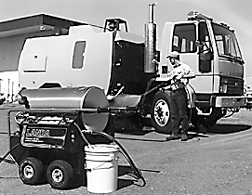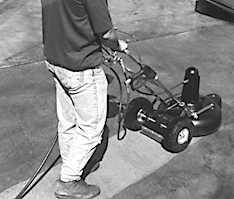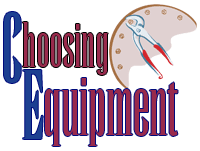
The Essential Information You Need About Pressure Washers
They're a necessity, not an option.
by Susan Scanga
High-pressure power washers, like sweepers, operate as a behind-the-scenes aspect of the business/industrial world. Both are also used in a wide variety of applications. Matt Wewel, National Sales Manager with Hotsy Corporation, says that his organization has identified more than 800 industries in which high-pressure washers have applications. These are as diverse as transportation, construction, food processing, agriculture, mining, livestock and - sweeping.
If you own a sweeper, you should also own a high-pressure washer. Experts recommend power washers for maintaining both the inside and outside of a sweeper, and people who are really in the know say they are not just recommended but required. It is another expenditure (albeit much less than the purchase cost of a sweeper), but to operate a sweeper without maintaining it with a power washer is like purchasing a car and then never bothering to change the oil.
A sweeper will operate much more efficiently when properly maintained. Regular cleaning of a sweeper's hopper with a pressure washer may lengthen its life by as much as 50%. In addition, the image portrayed by a sweeper that is clean and well kept up is much more positive than one that is not.
Operating a sweeper without pressure washing it
is like buying a car and then never bothering
to change the oil.
Despite all the advice to the contrary, some contractors still think that they can get the same results with a garden hose outfitted with a spray nozzle. They are incorrect. There is just not enough pressure to be effective. It wastes time and doesn't properly clean either the sweeper body or, most importantly, the inside of the hopper. It also wastes water.
Most people think that pressure washers use more water than a garden hose because of their apparent high volume of water combined with pressure. In fact, high-pressure washers use only about half as much water. This is doubly important from the combined standpoints of wastewater disposal and water conservation. Since EPA regulations require that all washwater be recycled, the goal is to use as little water as possible, yet still get the job done.
It is also highly recommended that a biodegradable or otherwise environmentally friendly soap be used. Most companies who sell washers also sell soap. Some even market their own brand, and many of these contain a degreaser.
High-pressure washers work much the same as do washing machines or dishwashers. There are three components necessary to all of their washing processes: water, agitation (in this case pressure), and soap. Pressure washers are also subdivided further into the two main categories of 'hot' and 'cold.'
A rule of thumb is that if items containing grease or oils need washed, then a hot water pressure washer is needed to cut these fluids. If the washer will only be used to keep your sweeper and hopper clean, a cold water washer could be adequate for the job. Most sweepers clean areas where cars have been leaking oil, and have some amounts of leakage themselves from oil and hydraulics, so most in the industry find a hot water power washer to be the better choice.
If you do opt for a cold water washer, get one that is suited for a commercial application. The light-duty residential washers on the market can be tempting because of their low cost (usually $350 to $500), but they simply won't stand up in an industrial use. A suitable cold water washer will probably cost nearly $1,000, and approach $2,000 on the top end.
Hot water pressure washers used in wash bays typically will have an electric motor to power the spray system, although in some cases a gasoline or diesel engine may be used. A diesel, natural gas, or LP-fired furnace is also one of the components. It is designed to heat the water to about 190° F.
When choosing a hot water washer, it is also important to settle on a machine with the right rating. A light-duty washer is one that will receive less than five hours use per week. These machines will be appropriate for an organization with just a sweeper or two. A medium-duty, or 'commercial grade,' washer is one that will be used 5 to 20 hours per week. These are generally suitable for someone with two to five sweepers. The final step is an 'industrial grade' washer that is intended to be used 20 or more hours per week.
Regular cleaning of a sweeper's hopper with a pressure washer
may lengthen its life by as much as 50%.
The output from high-pressure washers is measured in pounds per square inch (PSI), and the range of most units is from 500 to 4,000 PSI. Even though these pieces of equipment are called high-pressure washers, the actual pressure of the water is not the most important factor. Rather, it is the volume of water that makes the difference. For example, two gallons of water at 4,000 PSI will not work as effectively as four gallons of water at 2,000 PSI. It turns out that the combination of high volume/high PSI or high volume/low PSI will do a good job, but not low volume/high PSI.
For hopper cleaning, you need a washer that's equipped only with a trigger gun and wand, and you don't need a mobile unit. Most sweeper operators install their power washers permanently into a wash bay. However, some in the industry have found that they can use the same pressure washer to both clean their sweeper and take to contract jobs.
To accomplish this, they buy a gas-powered pressure washing unit with fork lift brackets attached. The washer can then be loaded easily onto a truck or trailer for transport to a jobsite and just as easily returned to the wash bay at day's end. Although most sweeping contractors who offer pavement cleaning use different machines from those which they use for their hopper cleaning, the possibility of using one washer for both jobs may be an option to investigate.
For contract pressure washing work, add-on accessories allow you to get more versatility from your washer. For example, a special wand is available which replaces the normal spray gun. This wand will allow sand and other abrasives to be injected into the water for paint and graffiti removal. For some contractors, this can become a lucrative add-on business. It is also a consideration for some public works departments.

According to Tom Tunnell, VP of Industrial Cleaning Sales for Landa, Inc., another commercial application is available as long as you have a pressure washer powered by at least a 10 hp gas engine. Units with engines of that size and larger provide enough power to operate a pavement surface cleaner, which is used for cleaning flat surfaces such as parking areas and sidewalks. The typical attachment for this purpose looks something like a lawnmower with wheelbarrow handles. The operator walks behind the machine as it directs a jet of water toward the pavement surface, making a clean path. Although trigger gun sprayers can be used on pavement, they tend to leave streaks. The pavement cleaning accessory does a much better job on paved surface areas.
To ensure that you end up with a washer designed to clean well in your own applications, be sure to give some serious thought to how you anticipate using the machine. Then, discuss your needs with someone qualified and experienced with both pressure washing and pressure washing equipment.
To contact Landa, Inc., call Tom Tunnell at 1-800-547-8672, and choose extension 164.
Hotsy Corporation may be reached at 1-800-525-1976.
Susan Scanga is a freelance writer and photographer currently residing in the Pacific Northwest.
This article is reprinted from American Sweeper magazine, v4 n2.
|

